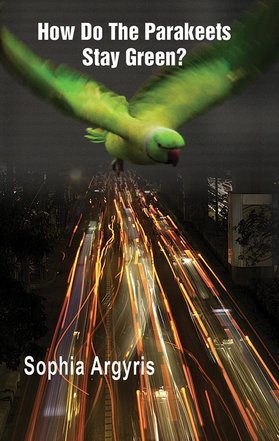Review of Sophia Argyris' How Do the Parakeets Stay Green?

Paperback: 52 pages
Publisher: Indigo Dreams Publishing (June 2014)
Available for purchase at: Indigo Dreams Publishing
Review by April Michelle Bratten
I have been a long time reader and supporter of Sophia Argyris' work. To give away exactly how many years I have been avidly reading her writing might horribly age myself, but let's just say this time frame is sliding closer to a decade than not. There is a simple reason for the longevity of my respect and earnest readership; she's really that good. Sophia has always been gifted with the ability to both startle and soothe in one shot. Her poetry is heavily involved with her reader, stealing something vital from them, and then returning something more wonderful than they ever expected back. Full of movement, feeling, and beauty, her poems are certainly a pleasure to return to over and again.
When previously asked about her current book, How Do the Parakeets Stay Green?, I said it was, "a graceful, passionate, and alluring collection from one of my favorite writers in contemporary poetry. Sophia Argyris is a beautiful writer producing meaningful and exciting poems about self-discovery, the world, and life." Now I am in the position to expand on those ideas and provide some examples from her stunning poetry.
In her poem, "Dearly Departed Daddy Longlegs," Argyris writes, "We're older now, and loss / is something very different." These lines capture the essence of this collection. There is a maturity here, a discovery through the poems that leads to a place that is familiar, yet quite unfamiliar. Yes, there is a loss of innocence, but there is also a struggle for it not to fade entirely. The poems often reflect on a longing for the return of innocence, helping the memory survive, its beauty and simplicity. "Long gone the innocence of / those green garden graves." Oh, how we miss it when it's gone. In "Fledge," the past was where "We wound our way through / months drenched green / with growing." The past was not perfect, but it was alive, green, and fresh with spirit.
In contrast, the turbulence of maturity, the present day, feels dangerous, complex, and many of these poems are dark and salty, awash in the seas that surround. One of my favorite poems from the entire collection, "The Bruising Stones," kick-starts the book off with this theme of innocence vs. maturity:
Then I was a fish, sliding
my marbled body over
the bruising stones,
blue limbed, pale, and
misted as Scottish mornings.
Later we sat, a circle, fire
smoked our salmon skin,
an adventure away from walls,
rules, all things that
bewildered us.
Here the past is pale, but sleek and beautiful. It is quiet, purely alive, and free of responsibility. It carries with it freedom and excitement. Fearless, it might get injured by stone or fire, but it is not afraid to heal. So, what happens when those days are gone?
I am living as a human now,
fully grown, carving
my life in stone buildings,
searching for the ways,
the words, to stay in touch
with us when we were fishes.
We change from fish to human, child to adult, evolve from innocence to maturity. We do not stay the same, and in desperation, we grasp at the fading memories. Do we become something uglier as time passes, something harsher, more concrete? As the title of the book suggests, there is a longing to stay the same, to avoid the complexities of experience, to remain smoke, elusive. How do the young birds keep their colors as we cannot help but lose our own? In the title poem, "How Do the Parakeets Stay Green?" Argyris hints at the answer to this question for us:
The city sprawls before us,
her concrete skin all too familiar,
we have travelled her veins
too many days to number.
Chameleons, we're turning
grey to match her.
Whereas youth stays green and colorful, bright, the present changes to match the grey surroundings that have enveloped us. However, Argyris makes sure that this transition is an intriguing and thrilling read, a beautiful process. She shows us this in her poem, "Unseen":
I feel my fading, slightly see-through
camouflaged against the backdrop
of a city that has no use for me.
I could age more comfortably with the hills,
wide white skies, grey smoothed
rocks, and heather.
The winner of the Geoff Stevens Memorial Poetry Prize 2013, How Do the Parakeets Stay Green is well worth your time and money. I strongly advise and encourage all to pick up a copy (or two.)
Publisher: Indigo Dreams Publishing (June 2014)
Available for purchase at: Indigo Dreams Publishing
Review by April Michelle Bratten
I have been a long time reader and supporter of Sophia Argyris' work. To give away exactly how many years I have been avidly reading her writing might horribly age myself, but let's just say this time frame is sliding closer to a decade than not. There is a simple reason for the longevity of my respect and earnest readership; she's really that good. Sophia has always been gifted with the ability to both startle and soothe in one shot. Her poetry is heavily involved with her reader, stealing something vital from them, and then returning something more wonderful than they ever expected back. Full of movement, feeling, and beauty, her poems are certainly a pleasure to return to over and again.
When previously asked about her current book, How Do the Parakeets Stay Green?, I said it was, "a graceful, passionate, and alluring collection from one of my favorite writers in contemporary poetry. Sophia Argyris is a beautiful writer producing meaningful and exciting poems about self-discovery, the world, and life." Now I am in the position to expand on those ideas and provide some examples from her stunning poetry.
In her poem, "Dearly Departed Daddy Longlegs," Argyris writes, "We're older now, and loss / is something very different." These lines capture the essence of this collection. There is a maturity here, a discovery through the poems that leads to a place that is familiar, yet quite unfamiliar. Yes, there is a loss of innocence, but there is also a struggle for it not to fade entirely. The poems often reflect on a longing for the return of innocence, helping the memory survive, its beauty and simplicity. "Long gone the innocence of / those green garden graves." Oh, how we miss it when it's gone. In "Fledge," the past was where "We wound our way through / months drenched green / with growing." The past was not perfect, but it was alive, green, and fresh with spirit.
In contrast, the turbulence of maturity, the present day, feels dangerous, complex, and many of these poems are dark and salty, awash in the seas that surround. One of my favorite poems from the entire collection, "The Bruising Stones," kick-starts the book off with this theme of innocence vs. maturity:
Then I was a fish, sliding
my marbled body over
the bruising stones,
blue limbed, pale, and
misted as Scottish mornings.
Later we sat, a circle, fire
smoked our salmon skin,
an adventure away from walls,
rules, all things that
bewildered us.
Here the past is pale, but sleek and beautiful. It is quiet, purely alive, and free of responsibility. It carries with it freedom and excitement. Fearless, it might get injured by stone or fire, but it is not afraid to heal. So, what happens when those days are gone?
I am living as a human now,
fully grown, carving
my life in stone buildings,
searching for the ways,
the words, to stay in touch
with us when we were fishes.
We change from fish to human, child to adult, evolve from innocence to maturity. We do not stay the same, and in desperation, we grasp at the fading memories. Do we become something uglier as time passes, something harsher, more concrete? As the title of the book suggests, there is a longing to stay the same, to avoid the complexities of experience, to remain smoke, elusive. How do the young birds keep their colors as we cannot help but lose our own? In the title poem, "How Do the Parakeets Stay Green?" Argyris hints at the answer to this question for us:
The city sprawls before us,
her concrete skin all too familiar,
we have travelled her veins
too many days to number.
Chameleons, we're turning
grey to match her.
Whereas youth stays green and colorful, bright, the present changes to match the grey surroundings that have enveloped us. However, Argyris makes sure that this transition is an intriguing and thrilling read, a beautiful process. She shows us this in her poem, "Unseen":
I feel my fading, slightly see-through
camouflaged against the backdrop
of a city that has no use for me.
I could age more comfortably with the hills,
wide white skies, grey smoothed
rocks, and heather.
The winner of the Geoff Stevens Memorial Poetry Prize 2013, How Do the Parakeets Stay Green is well worth your time and money. I strongly advise and encourage all to pick up a copy (or two.)

Sophia Argyris was born in Belgium where she lived until the age of ten, before moving to Morayshire in Scotland. Her poems and short prose have been published in a number of journals, both in print and online, including Sarasvati, The Dawntreader, Up the Staircase Quarterly (US), Pyramid (US), Volume Magazine, Debris, and Decanto amongst others. Her poem ‘By Kew Bridge’ was a finalist in the Aesthetica Creative Works competition in 2008, and her first chapbook, ‘Strange Longing for a Monday’ was published in 2010 by erbacce-press. How Do the Parakeets Stay Green? was a winner of the Geoff Stevens Memorial Poetry Prize 2013. She is an active member of the Back Room Poets in Oxford, where she lives, writes, and teaches yoga.
